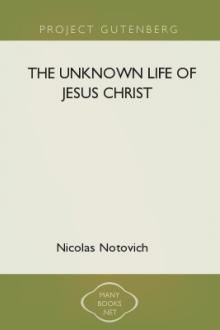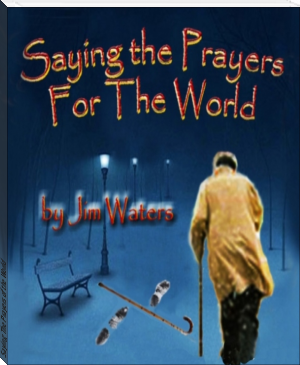The Unknown Life of Jesus Christ - Nicolas Notovitch (best novels in english txt) 📗

- Author: Nicolas Notovitch
- Performer: -
Book online «The Unknown Life of Jesus Christ - Nicolas Notovitch (best novels in english txt) 📗». Author Nicolas Notovitch
At Drass, my domicile was the post-house, which is a station—and the only one—of an unique telegraph line from Srinagar to the interior of the Himalayas. From that time on, I no more had my tent put up each evening, but stopped in the caravansarais; places which, though made repulsive by their dirt, are kept warm by the enormous piles of wood burned in their fireplaces.
From Drass to Karghil the landscape is unpleasing and monotonous, if one excepts the marvellous effects of the rising and setting sun and the beautiful moonlight. Apart from these the road is wearisome and abounding with dangers. Karghil is the principal place of the district, where the governor of the country resides. Its site is quite picturesque. Two water courses, the Souron and the Wakkha, roll their noisy and turbulent waters among rocks and sunken snags of uprooted trees, escaping from their respective defiles in the rocks, to join in forming here the river Souron, upon the banks of which stands Karghil. A little fort, garrisoned by two or three Sikhs, shows its outlines at the junction of the streams. Provided with a horse, I continued my journey at break of day, entering now the province of Ladak, or Little Thibet. I traversed a ricketty bridge, composed—like all the bridges of Kachmyr—of two long beams, the ends of which were supported upon the banks and the floor made of a layer of fagots and sticks, which imparted to the traveller, at least the illusion of a suspension bridge. Soon afterward I climbed slowly up on a little plateau, which crosses the way at a distance of two kilometres, to descend into the narrow valley of Wakkha. Here there are several villages, among which, on the left shore, is the very picturesque one called Paskium.
Here my feet trod Buddhist ground. The inhabitants are of a very simple and mild disposition, seemingly ignorant of "quarreling." Women are very rare among them. Those of them whom I encountered were distinguished from the women I had hitherto seen in India or Kachmyr, by the air of gaiety and prosperity apparent in their countenances. How could it be otherwise, since each woman in this country has, on an average, three to five husbands, and possesses them in the most legitimate way in the world. Polyandry flourishes here. However large a family may be, there is but one woman in it. If the family does not contain already more than two husbands, a bachelor may share its advantages, for a consideration. The days sacred to each one of those husbands are determined in advance, and all acquit themselves of their respective duties and respect each others' rights. The men generally seem feeble, with bent backs, and do not live to old age. During my travels in Ladak, I only encountered one man so old that his hair was white.
From Karghil to the centre of Ladak, the road had a more cheerful aspect than that I had traversed before reaching Karghil, its prospect being brightened by a number of little hamlets, but trees and verdure were, unfortunately, rare.
Twenty miles from Karghil, at the end of the defile formed by the rapid current of the Wakkha, is a little village called Chargol, in the centre of which stand three chapels, decorated with lively colors (t'horthenes, to give them the name they bear in Thibet). Below, near the river, are masses of rocks, in the form of long and large walls, upon which are thrown, in apparent disorder, flat stones of different colors and sizes. Upon these stones are engraved all sorts of prayers, in Ourd, Sanscrit and Thibetan, and one can even find among them inscriptions in Arabic characters. Without the knowledge of my carriers, I succeeded in taking away a few of these stones, which are now in the palace of the Trocadero.
Along the way, from Chargol, one finds frequently oblong mounds, artificial constructions. After sunrise, with fresh horses, I resumed my journey and stopped near the gonpa (monastery) of Moulbek, which seems glued on the flank of an isolated rock. Below is the hamlet of Wakkha, and not far from there is to be seen another rock, of very strange form, which seems to have been placed where it stands by human hands. In one side of it is cut a Buddha several metres in height. Upon it are several cylinders, the turning of which serves for prayers. They are a sort of wooden barrel, draped with yellow or white fabrics, and are attached to vertically planted stakes. It requires only the least wind to make them turn. The person who puts up one of these cylinders no longer feels it obligatory upon him to say his prayers, for all that devout believers can ask of God is written upon the cylinders. Seen from a distance this white painted monastery, standing sharply out from the gray background of the rocks, with all these whirling, petticoated wheels, produce a strange effect in this dead country. I left my horses in the hamlet of Wakkha, and, followed by my servant, walked toward the convent, which is reached by a narrow stairway cut in the rock. At the top, I was received by a very fat lama, with a scanty, straggling beard under his chin—a common characteristic of the Thibetan people—who was very ugly, but very cordial. His costume consisted of a yellow robe and a sort of big nightcap, with projecting flaps above the ears, of the same color. He held in his hand a copper prayer-machine which, from time to time, he shook with his left hand, without at all permitting that exercise to interfere with his conversation. It was his eternal prayer, which he thus communicated to the wind, so that by this element it should be borne to Heaven. We traversed a suite of low chambers, upon the walls of which were images of Buddha, of all sizes and made of all kinds of materials, all alike covered by a thick layer of dust. Finally we reached an open terrace, from which the eyes, taking in the surrounding region, rested upon an inhospitable country, strewn with grayish rocks and traversed by only a single road, which on both sides lost itself in the horizon.
When we were seated, they brought us beer, made with hops, called here Tchang and brewed in the cloister. It has a tendency to rapidly produce embonpoint upon the monks, which is regarded as a sign of the particular favor of Heaven.
They spoke here the Thibetan language. The origin of this language is full of obscurity. One thing is certain, that a king of Thibet, a contemporary of Mohammed, undertook the creation of an universal language for all the disciples of Buddha. To this end he had simplified the Sanscrit grammar, composed an alphabet containing an infinite number of signs, and thus laid the foundations of a language the pronunciation of which is one of the easiest and the writing the most complicated. Indeed, in order to represent a sound one must employ not less than eight characters. All the modern literature of Thibet is written in this language. The pure Thibetan is only spoken in Ladak and Oriental Thibet. In all other parts of the country are employed dialects formed by the mixture of this mother language with different idioms taken from the neighboring peoples of the various regions round about. In the ordinary life of the Thibetan, there exists always two languages, one of which is absolutely incomprehensible to the women, while the other is spoken by the entire nation; but only in the convents can be found the Thibetan language in all its purity and integrity.
The lamas much prefer the visits of Europeans to those of Musselmen, and when I asked the one who received me why this was so, he answered me: "Musselmen have no point of contact at all with our religion. Only comparatively recently, in their victorious campaign, they have converted, by force, part of the Buddhists to Islam. It requires of us great efforts to bring back those Musselmen, descendants of Buddhists, into the path of the true God. As regards the Europeans, it is quite a different affair. Not only do they profess the essential principles of monotheism, but they are, in a sense, adorers of Buddha, with almost the same rites as the lamas who inhabit Thibet. The only fault of the Christians is that after having adopted the great doctrines of Buddha, they have completely separated themselves from him, and have created for themselves a different Dalai-Lama. Our Dalai-Lama is the only one who has received the divine gift of seeing, face to face, the majesty of Buddha, and is empowered to serve as an intermediary between earth and heaven."
"Which Dalai-Lama of the Christians do you refer to?" I asked him; "we have one, the Son of God, to whom we address directly our fervent prayers, and to him alone we recur to intercede with our One and Indivisible God."
"It is not him of whom it is a question, Sahib," he replied. "We, too, respect him, whom we reverence as son of the One and Indivisible God, but we do not see in him the Only Son, but the excellent being who was chosen among all. Buddha, indeed, has incarnated himself, with his divine nature, in the person of the sacred Issa, who, without employing fire or iron, has gone forth to propagate our true and great religion among all the world. Him whom I meant was your terrestrial Dalai-Lama; he to whom you have given the title of 'Father of the Church.' That is a great sin. May he be brought back, with the flock, who are now in a bad road," piously added the lama, giving another twirl to his prayer-machine.
I understood now that he alluded to the Pope. "You have told me that a son of Buddha, Issa, the elect among all, had spread your religion on the Earth. Who is he?" I asked.
At this question the lama's eyes opened wide; he looked at me with astonishment and pronounced some words I could not catch, murmuring in an unintelligible way. "Issa," he finally replied, "is a great prophet, one of the first after the twenty-two Buddhas. He is greater than any one of all the Dalai-Lamas, for he constitutes part of the spirituality of our Lord. It is he who has instructed you; he who brought back into the bosom of God the frivolous and wicked souls; he who made you worthy of the beneficence of the Creator, who has ordained that each being should know good and evil. His name and his acts have been chronicled in our sacred writings, and when reading how his great life passed away in the midst of an erring people, we weep for the horrible sin of the heathen who murdered him, after subjecting him to torture."
I was struck by this recital of the lama. The prophet Issa—his tortures and death—our Christian Dalai-Lama—the Buddhist recognizing Christianity—all these made me think more and more of Jesus Christ. I asked my interpreter not to lose a single word of what the lama told me.
"Where can those writings be found, and who compiled them?" I asked the monk.
"The principal scrolls—which were written in India and Nepaul, at different epochs, as the events happened—are in Lhassa; several thousands in number. In some great convents are to be found copies, which the lamas, during their sojourn in Lhassa, have made, at various times, and have then given to their cloisters as souvenirs of the period they





Comments (0)